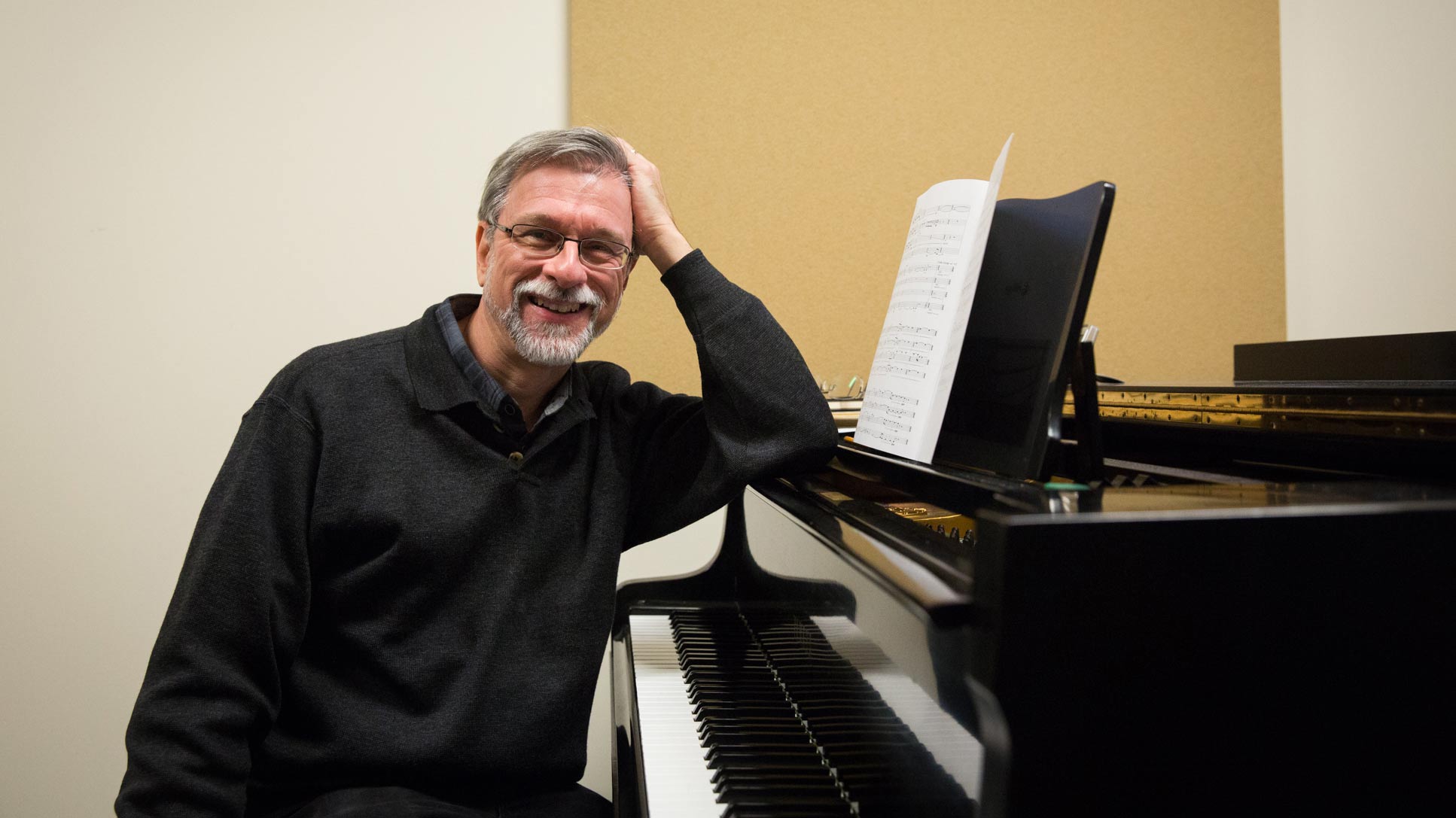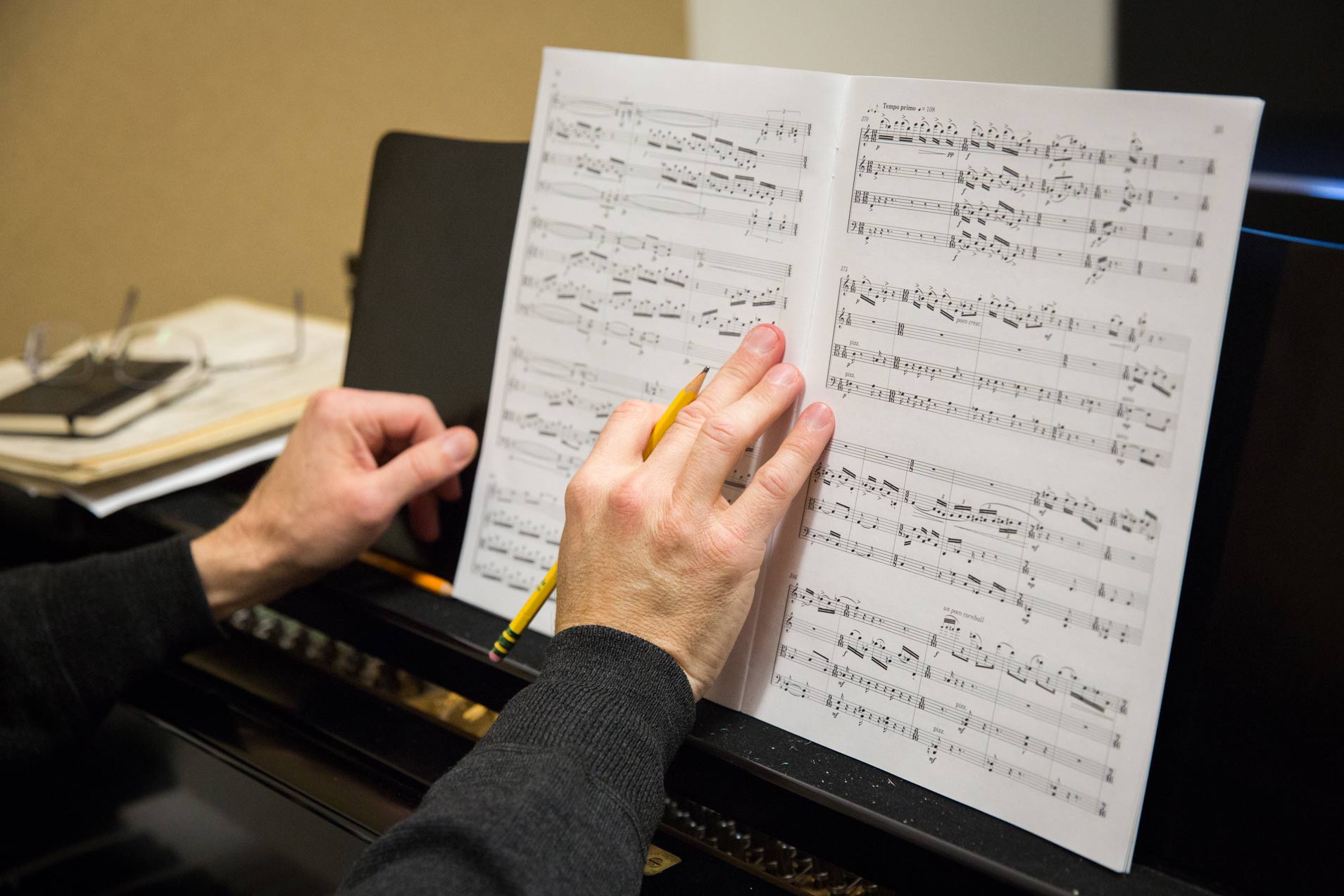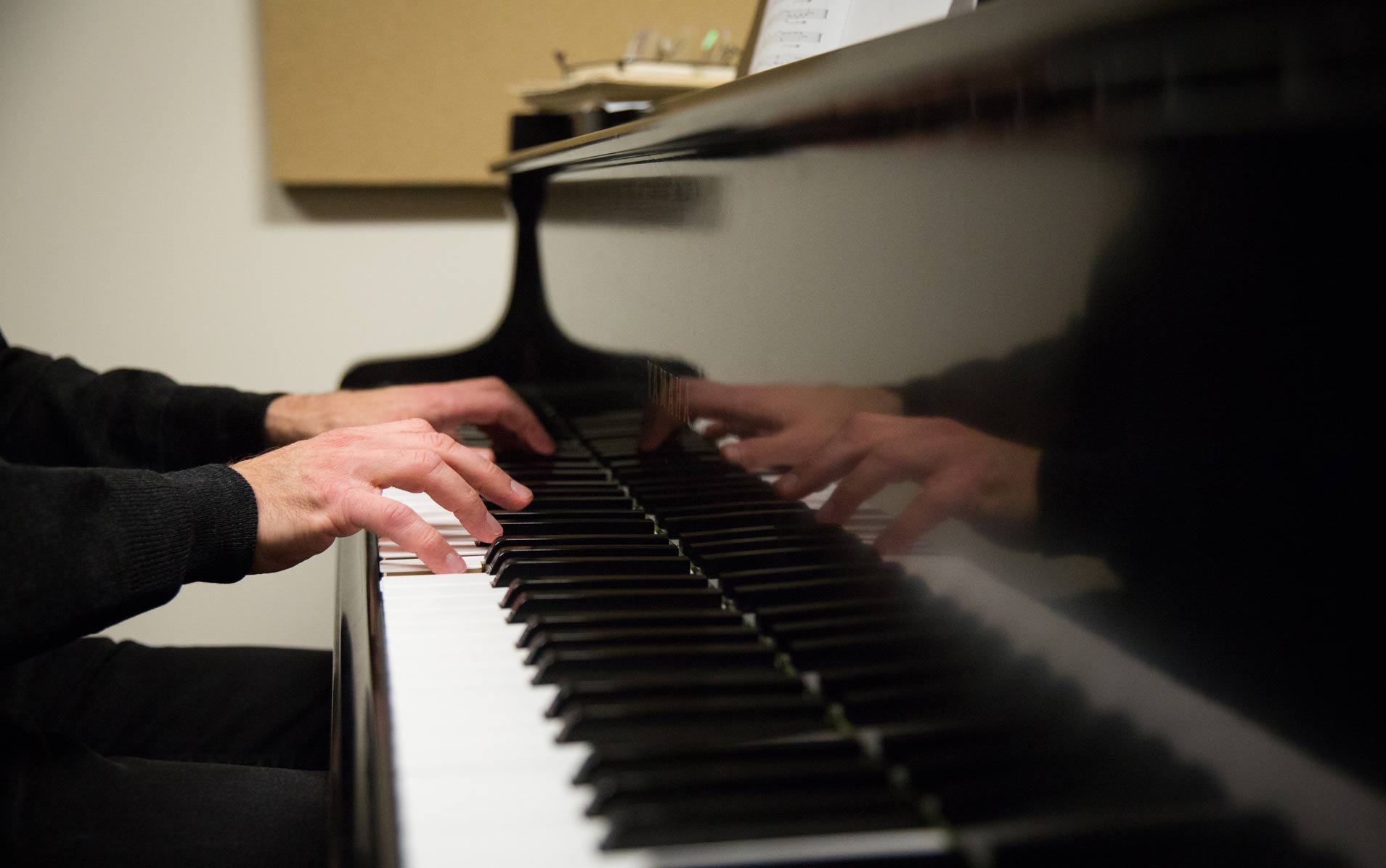This spring was a quiet time for music, but a big season for James Primosch, Professor of Music. He was honored with the 2020 Virgil Thomson Award in Vocal Music, administered by the American Academy of Arts and Letters, and was featured on two albums: Carthage with The Crossing, and Descent/Return with Lucy Fitz Gibbon and Ryan McCullough.
Though he played the piano as a youth, Primosch says he didn’t start his serious study of composition until he went to college at Cleveland State University, in his hometown. He came to Penn for his master’s degree, took a year off and played in a piano bar in Philly, then went to Columbia for his doctorate. He returned to Penn as a faculty member in 1988.
Primosch’s instrumental, vocal, and electronic compositions range from lyrical to religious to jazz-inspired. His music has been reviewed in the New Yorker, The New York Times, and numerous other publications, and has been performed throughout the U.S., Europe, and Asia. He’s previously been honored with a grant from the National Endowment for the Arts and a Guggenheim Fellowship. As a pianist he was a prizewinner at the Gaudeamus Interpreters Competition in Rotterdam.
We asked him how one becomes a composer, how he goes about writing music, and the future of music performance after COVID-19.
Q: How do you approach a composition?
You try to balance the intuitive and the conscious rational thought. They're both going at once or in rapid alternation. For the pieces on the two new albums, the music is text-driven to some extent. So I find I'm attracted to a poem and I'll see it as possible for musical setting, partly due to the expressive quality of the poem. But also the shape of the poem, which you might call the dramatic arc, seems to suggest some kind of analogous musical arc. My settings are typically naturalistic, meaning the rhythms are following the rhythms of the words.
It's also the circumstances. Who are you writing for? I wrote a piece for a local organization, Network for New Music, a couple of years ago. I knew I'd be playing the piano part. So guess what, the piano part was not that hard. [laughs]
Q: How much is inspiration versus perspiration?
Certainly it's some kind of balance. But steady work is helpful in calling down inspiration. There are moments when solutions come to you, but then there are moments where you need to put your technique to work and say, okay, I don't know what I'm supposed to do. What are five things I could do to move forward? Then see what's the best among them—or the least bad—and deploy your technique. Maybe then inspiration will visit.
Q: How does one learn to compose?
Well, usually it starts with imitation. In teaching my undergrads, I might ask them to write a piece that's emulating Mozart or Haydn’s style. So you're getting to know the vocabulary of that idiom and seeing what it affords, what you can do with it, what might be hard to do with it. Then building on that vocabulary, that body of techniques, you can start to do something that's not specifically modeled but is your own construction.
Some strategies in teaching are very basic, like encouraging a student to explore different media. If you've done vocal music, what if you wrote a string trio? Just to flex your muscles with a different challenge. A composer should have a big toolbox of possibilities rather than a few things that sound great.
At a surprisingly early age, you'll be repeating yourself. So you want to have a lot of different things that you're capable of. It's like any other art form. You question yourself, and it's difficult because you're shifting between thinking, I'm really supposed to be doing this. This is what I'm called to do, at one extreme. The other extreme is that you're thinking, I'm only doing this because I'm lazy and because it's what is familiar and comfortable to me. It's the same way, I'm sure, for poets and novelists.
Q: Are there ways your teaching informs your composing and vice versa?
My grad students are very mature and sophisticated. They're really young colleagues. There might be composers they’re aware of that I'm not. Also, like anything else with colleagues, you bounce ideas off them. You might see things a young colleague is doing that challenge you and lead you to say, "Oh. I hadn't thought of that. That's cool."
Q: You seem to be attracted to texts. Is that one reason you compose for voice a lot?
I never thought of myself as a vocal guy, but then if you look at my pieces, there's a lot of vocal music. Partly it's just that people have asked me for vocal pieces, and one thing leads to another.
As for texts, it's really luck. Perhaps my most performed song is a setting of a poem by Susan Stewart, who at the time was an English professor at Penn, though I didn’t know her. There was an article in the Inquirer about her because she had won a big award, and they published a short poem of hers. I looked at it and said, “I can set this. I will set this.” It's since become my most performed song. Now she's written poems specifically for projects of mine. It's really just a happy circumstance.
I read poetry and come across material in my reading. It's really kind of a love at first sight kind of thing. Sometimes texts will sit in a file folder for years and years. The big piece on The Crossing's album, the “Mass for the Day of St. Thomas Didymus,” is a combination of the Latin Mass texts interwoven with poems by Denise Levertov that reflect on those texts. I had known the Levertov since undergrad. The right situation to use it for musical setting didn't come along. When The Crossing had a competition for proposals for new pieces, I hit on the idea of using the Levertov in combination with the Latin, and here we are now with the recording coming out.
Q: Are you ever surprised when you hear a piece performed?
Well, you're trained to imagine it vividly as you are composing. But I think people who say they're never surprised are not being quite honest. There's always a certain element of surprise, but mostly I've calculated things and imagined them in such a way that I'm not super surprised. There might be small details that I miscalculated or places where I was guilty of wishful thinking.
I use music notation software that can play back the pitches and the rhythms. I don't make any judgements about my instrumental writing from that, but I find it helpful with timing. I also make fewer proofreading errors because I'll hear wrong notes when the computer plays them back. But to me, I can't make any judgements about the balance between the piano and the flute on the basis of what the synthesizer is doing. That would be an illusion.
Q: We’re doing this interview on the day when the ceremony for your Virgil Thomson Award would have been held in Manhattan. How do you see music at this moment in time?
It's certainly a huge question. There's a lot of stuff going on online, and it's charming and often touching, but is it a real concert life? Not really. It's not going to replace live performance.
You see people saying, "Well, we're not going to go back to the way everything was." A few days ago Chorus America said that basically they estimated or guessed that it would be two years before choral singing could be happening. Certain orchestras are doing pieces for small instrumentation and seating the players far apart.
I'm continuing to compose. I'm working on a project for tenor saxophonist Matt Levy and electronic sound. I've done pieces like this in the past, where a live performer is combined with playback of an electronic component. So the electronic component is something I can work on here in my home. Maybe the premiere will be in Matt's studio. I'm thinking about how I'm going to teach some courses this fall. I’ll do the best I can, try to do right by my students, and we'll see.
Hear Primosch talk about the new albums Carthage with The Crossing, and Descent/Return with Lucy Fitz Gibbon and Ryan McCullough, and listen to excerpts.






